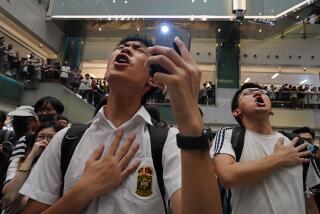TURMOIL IN CHINA: Protests For Democracy : Hong Kong Stock Market Plunges 22% : Colony, Fearing Future Chinese Rule, Shows Signs of Panic
- Share via
HONG KONG — Panic began to spread through financial markets in this British colony Monday as residents reacted to the weekend bloodshed in Beijing with deep anxiety over their future under eventual Communist rule.
Hong Kong’s already jittery stock market plummeted nearly 22%, the worst single-day loss since the October, 1987, global crash.
At the same time, trade union leaders prepared to stage a general strike Wednesday to protest the Beijing government’s brutal crackdown on pro-democracy demonstrators, whose cause has been celebrated--and to a large extent financed--by Hong Kong Chinese.
Organizers said they will exempt essential services such as banking, communications and transportation, but the action is expected to grind work to a halt in this vibrant business capital.
Protest Demonstrations
Already, hundreds of thousands of residents have turned out to express sympathy with the demonstrators in Beijing, most recently on Sunday, when a crowd estimated at 200,000 rallied at the Hong Kong Jockey Club, according to local news reports. Mass demonstrations in the colony peaked May 28, when about 1.5 million people marched.
And depositors with accounts at banks controlled by mainland China reportedly withdrew their funds in protest of the violence in Beijing.
About 5,000 protesters gathered Monday outside the offices of the official New China News Agency, Beijing’s unofficial diplomatic mission, demanding to see Xu Jiatun, head of the delegation. David Wilson, the Hong Kong governor, reportedly met with Xu later in the day to express “revulsion” over the military violence and to ask for cooperation from the Chinese government in safeguarding Hong Kong residents who have remained in Beijing.
The question of protecting the safety of Hong Kong Chinese took on urgency early today with reports that Lee Cheuk-yan, a local labor leader, was detained by Chinese police as he attempted to board a charter jet at the Beijing airport. Lee went to the Chinese capital last week with a delegation carrying $260,000 in U.S. currency in donations for the pro-democracy students camping out in Tian An Men Square.
The pilot of the Dragon Air Boeing 737, chartered by the Hong Kong government to evacuate about 125 Hong Kong journalists, business people and students, told reporters about Lee’s arrest on arrival at Kai Tak Airport shortly after midnight. The unionist, in his early 30s, reportedly was detained because his home visit permit, a travel document allowing overseas Chinese to visit the mainland, had not been properly inspected.
The incident came amid rising fears that Hong Kong Chinese might be subject to arbitrary abuse of authority by the Communists because they do not enjoy any diplomatic protection by Britain, which has recognized Beijing’s sovereignty over Hong Kong and its territories.
Indeed, a small group of Hong Kong journalists taking refuge Monday at the Beijing Hotel, near the center of the weekend bloodshed, sought assistance from the British Embassy when they panicked at a report that the hotel would be raided by troops. They were told to fend for themselves.
Mabel Chan, a reporter for Television Broadcast Ltd., a local channel, said she phoned the embassy repeatedly and was told by a duty officer, “We are not in a position to help you at this point.” Chan returned to Hong Kong on the Dragon Air flight.
About 16 Hong Kong journalists chose to remain in Beijing, according to Sani Harte, assistant news editor of the South China Morning Post.
Postponed Visit
Meanwhile, Wilson is reported to have postponed until Wednesday his departure for London, where he was to meet with British Foreign Secretary Geoffrey Howe to discuss the Chinese crisis.
In London, Prime Minister Margaret Thatcher’s government came under increasing pressure to take a new look at the 1984 Anglo-Chinese agreement that sets the framework for returning the British colony of Hong Kong to Chinese rule in 1997.
Opposition members of Parliament have called for the government to reconsider terms of the accord that fails to provide any so-called “lifeboat” for the colony’s 5.5 million residents if China should renege on its commitment to guarantee the colony’s current capitalist, democratic character.
Gerald Kaufman, the opposition Labor Party’s foreign affairs spokesman, also said he would ask for a formal government statement on the China crisis in the House of Commons today.
The leader of the smaller Liberal Democrats opposition party, Paddy Ashdown, called on the government to offer British nationality to those born in Hong Kong as what he termed “an ultimate insurance policy” against a possible authoritarian takeover by a Chinese regime.
Ashdown, who once studied in China and speaks Chinese, said: “If the upshot of this struggle for power in China is not a return to democracy and reform, then in my view the British government is going to have to think very seriously about mechanisms for providing the people of Hong Kong the ultimate insurance policy of somewhere to go to at the end of the day.”
Hong Kong’s executive and legislative counselors held an emergency meeting Monday and issued a statement condemning the violence in Beijing.
Schoenberger reported from Hong Kong and Marshall from London.
More to Read
Sign up for Essential California
The most important California stories and recommendations in your inbox every morning.
You may occasionally receive promotional content from the Los Angeles Times.










